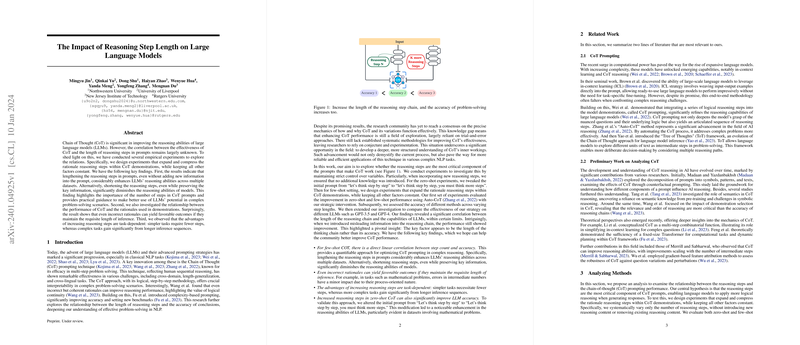Overview
The paper "The Impact of Reasoning Step Length on LLMs" (Jin et al., 10 Jan 2024 ) offers an empirical investigation into how varying the length of reasoning steps in Chain of Thought (CoT) prompts influences the performance of LLMs. By manipulating CoT demonstrations—either expanding or compressing the reasoning chains while holding semantic content constant—the paper isolates the effect of step-length on the model’s capacity to perform complex reasoning tasks. The approach provides a quantitative basis for why an extended reasoning process may enhance performance, particularly in zero-shot and few-shot settings.
Methodological Considerations
The experiments in this paper are meticulously designed to control for confounding variables other than the length of the reasoning chain. The paper employs two primary types of CoT paradigms: Manual-CoT and Auto-CoT. Adjustments to prompt formulations include variations such as explicitly instructing the model to “think step by step” versus more elaborate formulations that enforce additional intermediate inference steps. Key methodological steps include:
- Expanded Reasoning Chains: Maintaining the same key information but artificially increasing the number of inference steps.
- Compressed Reasoning Chains: Reducing the number of steps while preserving critical information, allowing a direct assessment of step length versus information content.
- Task-Dependent Evaluation: The experiments span both relatively simple and highly complex tasks, revealing a differential sensitivity of model performance to reasoning chain length.
Notably, the paper also assesses the effect of “incorrect” or suboptimal intermediate reasoning. The experiments indicate that even when intermediate steps contain errors, extending the reasoning chain still tends to improve final accuracy.
Key Findings and Numerical Evidence
The paper presents several quantitative and qualitative conclusions regarding the impact of reasoning step length:
- Enhanced Performance with Longer Chains: Extending the number of reasoning steps correlates with considerable improvements in model performance. For instance, tasks with increased chain length see a measurable boost in accuracy, sometimes exhibiting a nearly linear relationship up to a saturation point. This linearity suggests that, within a particular regime, additional steps continue to aid in error mitigation and reasoning stability.
- Degradation with Compression: Shortening the chain, even when key elements are present, leads to a significant reduction in performance. This suggests that the intermediate steps, despite not always being semantically optimal, provide critical scaffolding that enhances the model’s inferential capabilities.
- Task Complexity Dependency: A nuanced result is that simpler tasks derive marginal benefits from added reasoning steps compared with more complex tasks. This highlights the necessity of dynamically adjusting the inference chain based on task-specific demand. For complex problem-solving scenarios, an enriched chain of reasoning is essential.
- Robustness to Reasoning Fidelity: One striking outcome is that even in the presence of erroneous intermediate steps, maintaining chain length preserves beneficial performance outcomes. This suggests that the process of step-by-step reasoning provides a form of regularization that improves overall reasoning even when individual steps are not strictly correct.
Implications for CoT Prompt Design
The research delivers practical guidelines for designing CoT prompts tailored for LLMs:
- Prioritization of Inference Length: The model’s performance gains hinge on the number of reasoning steps rather than the novelty or absolute correctness of each individual piece of reasoning. This indicates that when constructing CoT prompts, one should favor instructions that guide the model towards generating a more granular and extended reasoning process.
- Task-Dependent Prompt Engineering: Given that complex tasks significantly benefit from extended CoT, practitioners should incorporate adaptive prompt strategies. For instance, using conditional prompt templates that adjust the required length based on task complexity can balance computational overhead against performance gains.
- Zero-Shot and Few-Shot Enhancement: Enhancements in zero-shot performance are notable when prompts explicitly instruct the model to engage in detailed step-by-step reasoning. Prompt formulations such as “Let’s think step by step, and reach a conclusion with multiple inferences” have empirically demonstrated marked improvements, especially in domains like mathematical problem solving.
- Incorporation of “Think-Aloud” Strategies: While the use of inaccurate intermediate representations might seem counterintuitive, the experimental outcomes suggest that prompting models to “think aloud” in extended detail intrinsically aids in reaching correct solutions. The redundancy and iterative nature of the reasoning steps appear to mitigate errors encountered early in the chain.
Practical Implementation and Future Directions
For practitioners looking to operationalize these insights within a real-world system, the following considerations are pertinent:
- Prompt Template Libraries: Develop libraries of adaptive CoT prompt templates that dynamically adjust the reasoning chain length based on metadata or runtime assessment of task difficulty.
- A/B Testing for Inference Strategies: Conduct systematic A/B tests comparing extended versus compressed reasoning prompts in production to quantify performance improvements and assess computational trade-offs.
- Resource Allocation: Extended reasoning chains may require increased compute due to longer token sequences, potentially affecting throughput. Implement efficient caching and beam search algorithms to mitigate latency during inference.
- Error Analysis Pipelines: Deploy logging systems to capture the intermediate steps generated by LLMs. Analyzing these steps can provide additional insights into failure modes and further refine the chain length required for optimal task performance.
In summary, the paper underscores the critical role of reasoning step length in enhancing LLM performance. By incorporating a more granular and extended chain of reasoning, models demonstrate significantly improved generalization and accuracy, particularly on tasks that require deep inferential processes. This practical insight into CoT prompt engineering paves the way for developing more robust, adaptive, and efficient reasoning capabilities in LLMs.
